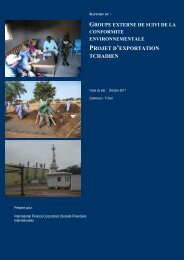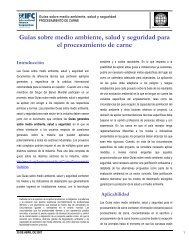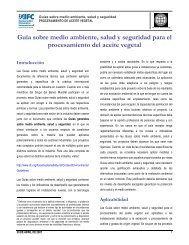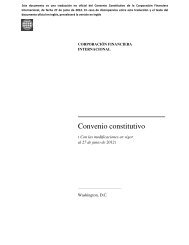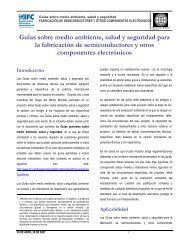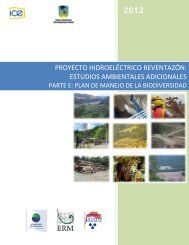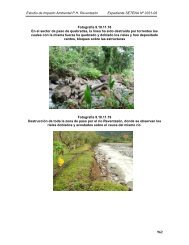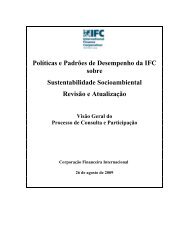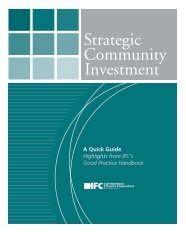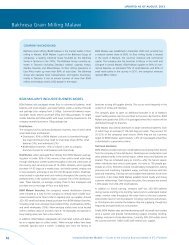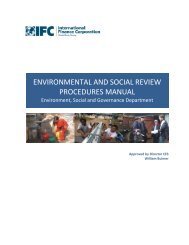Download PDF - IFC
Download PDF - IFC
Download PDF - IFC
You also want an ePaper? Increase the reach of your titles
YUMPU automatically turns print PDFs into web optimized ePapers that Google loves.
Making a Difference<br />
With Carbon Credits<br />
24 CLIMATE CHANGE<br />
The private sector is expected to provide<br />
80 percent of all financing needed to<br />
combat climate change. In the poorest<br />
countries, it has a strong partner in <strong>IFC</strong>.<br />
We can help in many ways, including increasing<br />
the commercial use of both cleaner energy<br />
sources like natural gas and renewable sources<br />
such as wind, solar, hydro, and biomass. Nigeria,<br />
a country that could become one of the<br />
world’s largest sources of natural gas, provides<br />
an example of what we can do.<br />
Natural gas can be used to fire large-scale power<br />
plants producing far fewer global-warming<br />
emissions than other kinds of thermal plants.<br />
But due to a weak domestic market and lack of<br />
important gas-gathering infrastructure, Nigeria<br />
instead burns off large quantities of its natural<br />
gas associated with oil production, spewing<br />
round-the-clock flames and fumes that contribute<br />
to climate change.<br />
<strong>IFC</strong> has helped find a solution by participating<br />
in the Global Gas Flaring Reduction (GGFR)<br />
partnership alongside the World Bank, governments,<br />
and major oil companies. GGFR<br />
works with both the private and public sectors<br />
to increase the use of associated gas. Instead of<br />
Nigeria<br />
wasting the gas, Nigeria now uses some of it to<br />
fuel a power plant in the troubled Niger Delta<br />
where local communities urgently need reliable<br />
electricity.<br />
In late 2006, GGFR provided carbon finance<br />
advice and other technical support that helped<br />
a proposed 450 MW gas-fired power plant at<br />
Kwale earn important carbon credits under the<br />
Kyoto Protocol. This was key to making this<br />
project commercially viable.<br />
In this context, Italian oil company Eni, a partner<br />
in the gas flaring initiative, invested more<br />
than $400 million to build the plant. It was the<br />
Kyoto treaty’s first Nigerian project, and one of<br />
its largest anywhere in the world. The impact<br />
of the carbon dioxide emissions from gas flaring<br />
it avoids over 10 years is equal to taking 2.7<br />
million cars off U.S. roads.<br />
The Kwale plant spells progress in the Delta.<br />
And its success in obtaining carbon credits<br />
could have an important replication effect in<br />
other countries around the world.<br />
Climate action is a core development<br />
priority for <strong>IFC</strong>.<br />
Satellite image of West Africa’s rampant burning of natural gas—a key source of air pollution today, but also<br />
one that can be converted to generate environmentally friendly power.<br />
25


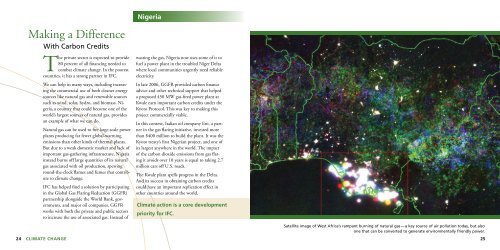
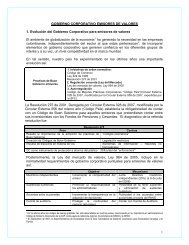
![Business Membership Organizations [pdf] - IFC](https://img.yumpu.com/15413100/1/190x245/business-membership-organizations-pdf-ifc.jpg?quality=85)
